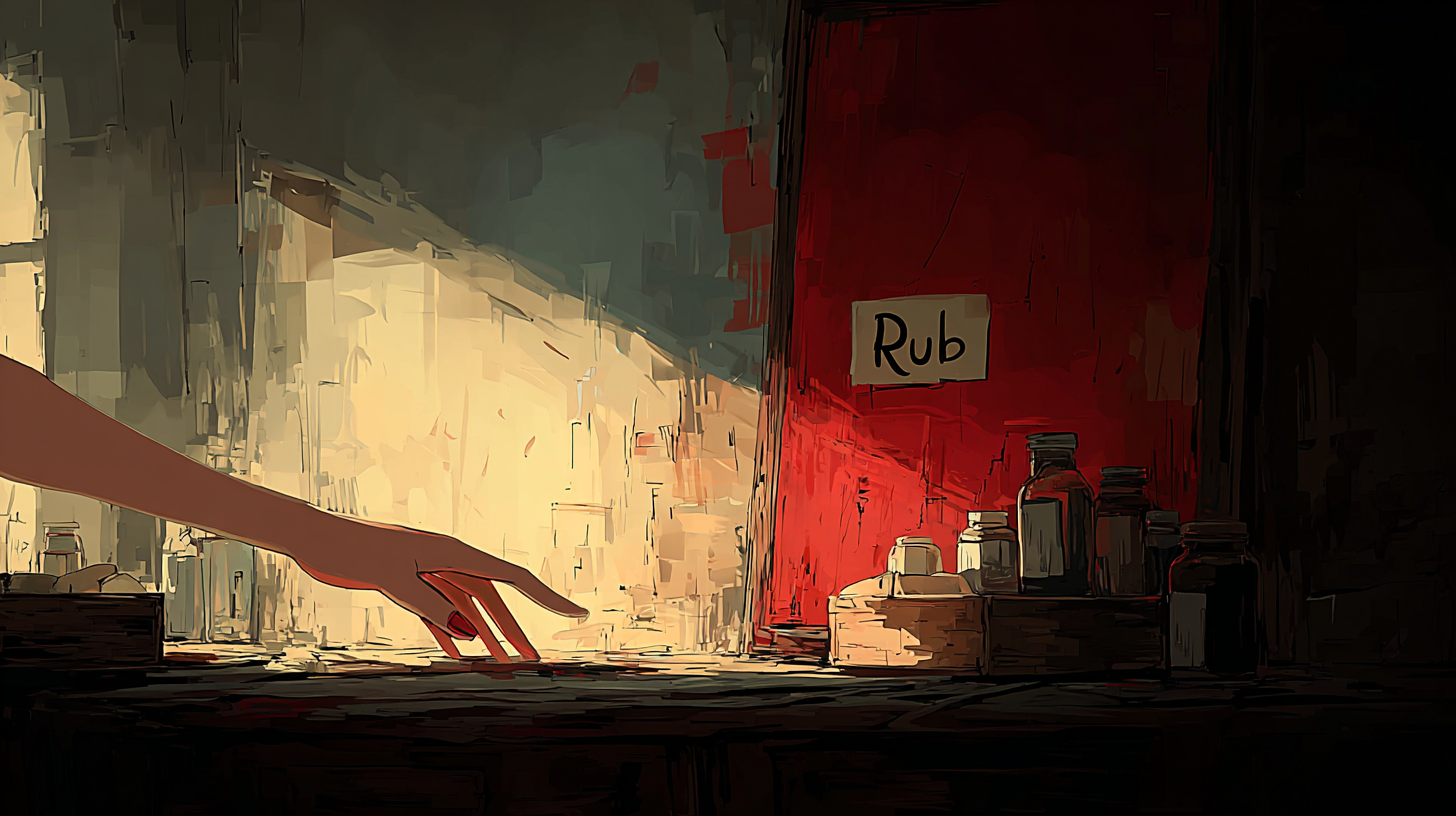“Rub” means to move your hand back and forth over something.
「rub」は手などで何かをこすることを意味します。
以下は英単語 “rub” に関するストーリー型学習コンテンツです。まずは大枠の意味を理解して最後の文章で確認しましょう。
「rub」の主な意味(main meaning)
| 品詞 | 意味 | 発音記号 | 英文例 |
|---|---|---|---|
| 動詞 (verb) | こする、なでる | /rʌb/ | She rubbed her eyes because she was sleepy. |
| 名詞 (noun) | 摩擦、こすること | /rʌb/ | The medicine will work better with a gentle rub. |
「rub」の語源(etymology)
「rub」は古ノルド語の rubba(こする)に由来し、「手で押したり動かすイメージ」が語の核にあります。
「rub」の類義語(synonyms)
| 類義語 | 例文 |
|---|---|
| scrub | He scrubbed the table until it was clean. |
| massage | She massaged her sore shoulder gently. |
| polish | He polished the shoes until they shone. |
| graze | The branch grazed his arm as he passed. |
| stroke | She stroked the cat’s fur softly. |
「rub」の反義語(antonyms)
| 反義語 | 例文 |
|---|---|
| pat | He gently patted the dog on its head. |
| ignore | She ignored the mark on the wall. |
「rub」のコロケーション(collocations)
| コロケーション | 例文 |
|---|---|
| rub eyes | The baby rubbed his eyes and yawned. |
| rub shoulders with | She rubbed shoulders with famous actors at the event. |
| rub it in | I know I lost—no need to rub it in! |
| rub the wrong way | His comment rubbed me the wrong way. |
| rub off on | Her kindness rubbed off on her classmates. |
「rub」の2項表現(binomials)
| 2項表現 | 例文 |
|---|---|
| wear and rub | The shoes showed signs of wear and rub. |
| scratch and rub | He tried to scratch and rub the itchy spot. |
英語ストーリー(english story)
Title: The New Job and a Strange Habit
When Lisa started her new job at the bookstore, she was excited to meet new people. On the first day, she rubbed her hands together nervously as she waited to be introduced. Her manager, Mr. Brown, was friendly and often rubbed shoulders with customers, chatting with them like old friends.
During her training, she noticed that her co-worker Mike had a strange habit. Every time he made a mistake, he would rub his forehead and say, “Don’t rub it in.” Lisa laughed the first time she heard it.
One day, a customer was upset because a book had a scratch and rub mark on the cover. Lisa calmly offered to replace it and even gave the customer a coupon. Mr. Brown was impressed. “Good job,” he said, patting her on the back. “You handled that well.”
Over time, Lisa’s confidence grew. She learned how to polish her communication skills and even began massaging her schedule to help others when needed. Her kindness started to rub off on Mike, who became more cheerful. Lisa thought, “This job is not just about books. It’s about people.”
和訳
タイトル:新しい仕事とちょっと変なクセ
リサは書店での新しい仕事にワクワクしていた。初日、彼女は紹介されるのを待ちながら、緊張して手を**こすって(rub)いた。マネージャーのブラウン氏は気さくで、よくお客さんと親しく話す(rub shoulders with)**人だった。
研修中、リサは同僚のマイクに奇妙なクセがあることに気づいた。彼はミスをするたびにおでこをこすって(rub)「そんなに責めないでくれ(rub it in)」と言うのだ。リサは初めてそれを聞いたとき、思わず笑ってしまった。
ある日、あるお客さんが、本の表紙にこすった跡(rub)と傷があると怒っていた。リサは落ち着いて交換を提案し、クーポンも渡した。ブラウン氏は感心して言った。「よくやったね」と、彼女の背中を軽くたたいた(pat)。
時間がたつにつれ、リサの自信はついてきた。彼女は会話力を磨き(polish)、他の人を助けるために自分のスケジュールを調整(massage)することもできるようになった。その優しさはマイクにもうつって(rub off on)、彼も前より明るくなった。リサは思った。「この仕事は本のことだけじゃない、人との関わりなんだ。」
「rub」のQ&A
- Qrub と scrub の違いは?
- A
「rub」は単にこする動作全般を指しますが、「scrub」はより力を込めてゴシゴシとこする意味があります。掃除や洗う場面でよく使われます。
- Qrub と massage はどう違う?
- A
「massage」は「体の一部を押したりなでたりして、ほぐす・癒す」目的があるこする行為です。一方、「rub」は目的に関係なく単にこすることも含みます。
- Qrub と polish の違いは?
- A
「polish」は「磨いて光らせる・仕上げる」ことが目的であり、「rub」は動作全体を指します。つまり、polish は rub の中でも特定の目的をもつ行為です。
- Qrub の反義語に pat があるのはなぜ?
- A
「pat」は軽くたたくという意味で、「こする(rub)」とは逆の動作です。どちらも手を使いますが、動きの方向や力の加え方が異なります。
- Qrub shoulders with の意味と使い方は?
- A
「rub shoulders with」は「有名人や重要な人たちと親しく接する」という意味の表現です。物理的にこするわけではなく、交流することを表します。
- Qrub it in の意味は?なぜ rub を使うの?
- A
「rub it in」は「人の失敗や弱みをわざと繰り返して責める」ことです。これは比喩で、「塩を傷口にこする」ようなイメージから来ています。
- Qrub the wrong way の意味は?
- A
「rub the wrong way」は「人の気分を害する・不快にさせる」という意味のイディオムです。毛並みに逆らってこするような不快感が語源です。
- Qrub off on の意味と使い方は?
- A
「rub off on」は「(性格や雰囲気が)人にうつる」という意味です。良い影響も悪い影響も表せます。例:Her kindness rubbed off on everyone.
| 単語 | 日本語の意味 | どんなときに使う? | ニュアンスの違い | 英文例 | 日本語訳 |
|---|---|---|---|---|---|
| rub | こする/擦る | 手や布で何かの表面をこするとき | 一般的で幅広い「こする」の意味 | She rubbed her hands together. | 彼女は手をこすり合わせた。 |
| scratch | 引っかく/かく | 爪や先のとがったもので表面をかく | 表面を「引っかく」「細く削る」動作 | The cat scratched the sofa. | 猫がソファを引っかいた。 |
| scrub | ごしごしこする/磨く | 汚れをしっかり落としたいとき | 強めに「磨く」・「洗い落とす」動作 | He scrubbed the floor. | 彼は床をゴシゴシこすった。 |
| massage | マッサージする/もむ | 手で筋肉をやわらかくする動作 | 揉んでリラックスさせる目的 | She massaged his shoulders. | 彼女は彼の肩をマッサージした。 |
| chafe | こすれて痛める/刺激する | 摩擦で皮膚が痛くなるとき | こすれて「赤くなる・ヒリヒリする」 | My backpack chafed my shoulder. | リュックで肩がすれて痛かった。 |
| wipe | 拭く/拭き取る | 汚れ・水・ホコリを布などで取る時 | 汚れ・水分をふき取るのが目的 | He wiped the table. | 彼はテーブルを拭いた。 |
ポイントまとめ
- rub:こする・摩擦する ⇒ 最も基本的で広い意味
- scratch:引っかく・傷をつける(鋭い動作)
- scrub:強くごしごしこする(汚れを落とす)
- massage:優しくもむ(リラックス・治療目的)
- chafe:こすれて肌が痛む(マイナスな感覚)
- wipe:汚れや水分を「拭き取る」



コメント